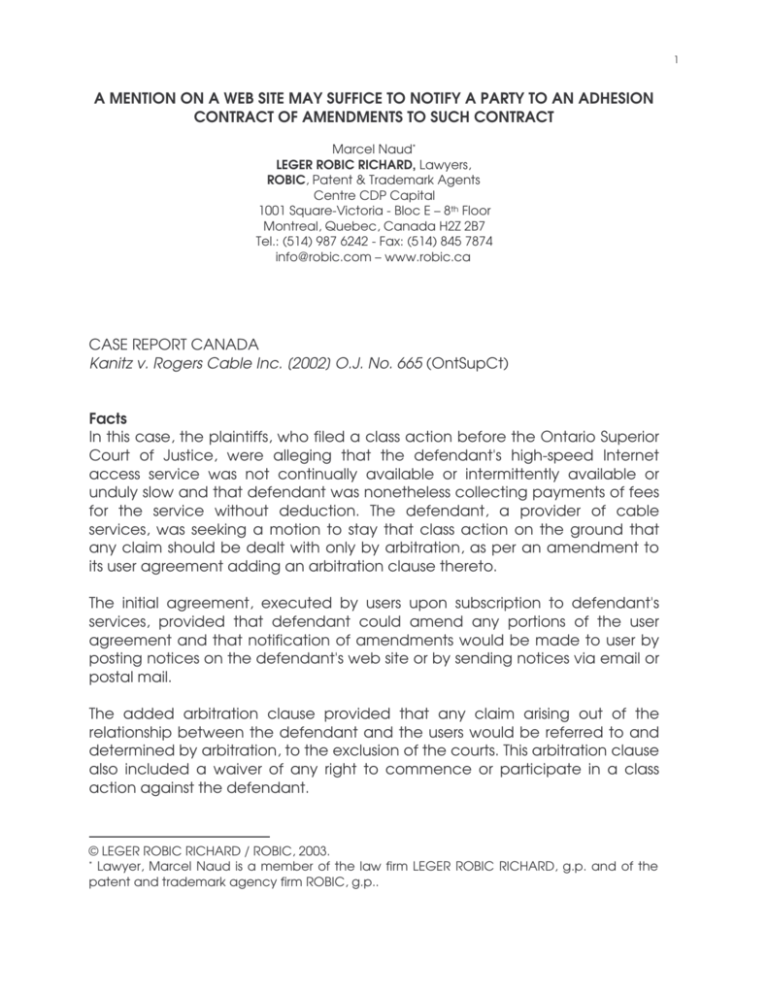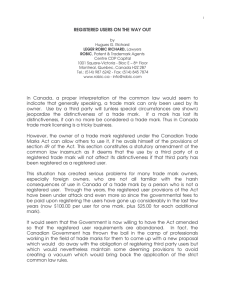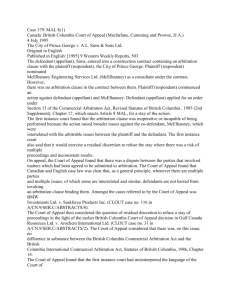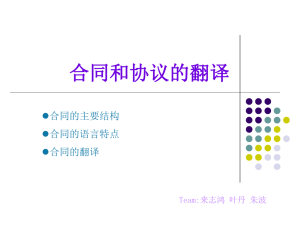a mention on a web site may suffice to notify a party to an adhesion
advertisement

1 A MENTION ON A WEB SITE MAY SUFFICE TO NOTIFY A PARTY TO AN ADHESION CONTRACT OF AMENDMENTS TO SUCH CONTRACT Marcel Naud* LEGER ROBIC RICHARD, Lawyers, ROBIC, Patent & Trademark Agents Centre CDP Capital 1001 Square-Victoria - Bloc E – 8th Floor Montreal, Quebec, Canada H2Z 2B7 Tel.: (514) 987 6242 - Fax: (514) 845 7874 info@robic.com – www.robic.ca CASE REPORT CANADA Kanitz v. Rogers Cable Inc. [2002] O.J. No. 665 (OntSupCt) Facts In this case, the plaintiffs, who filed a class action before the Ontario Superior Court of Justice, were alleging that the defendant's high-speed Internet access service was not continually available or intermittently available or unduly slow and that defendant was nonetheless collecting payments of fees for the service without deduction. The defendant, a provider of cable services, was seeking a motion to stay that class action on the ground that any claim should be dealt with only by arbitration, as per an amendment to its user agreement adding an arbitration clause thereto. The initial agreement, executed by users upon subscription to defendant's services, provided that defendant could amend any portions of the user agreement and that notification of amendments would be made to user by posting notices on the defendant's web site or by sending notices via email or postal mail. The added arbitration clause provided that any claim arising out of the relationship between the defendant and the users would be referred to and determined by arbitration, to the exclusion of the courts. This arbitration clause also included a waiver of any right to commence or participate in a class action against the defendant. © LEGER ROBIC RICHARD / ROBIC, 2003. * Lawyer, Marcel Naud is a member of the law firm LEGER ROBIC RICHARD, g.p. and of the patent and trademark agency firm ROBIC, g.p.. 2 The defendant posted the amended version of the user agreement in the "customer support" section of its web site, and mentioned the fact that the agreement was amended in the "News and Highlights" portion of that section's main page during a one-month period following amendments. The user agreement was accessible through a link from the "Policies and Agreements" page and from the "Rogers Docs" page of the customer support section of defendant's web site. These pages notably reminded the users that the user agreement was periodically updated and that they should check the site regularly to obtain the latest version. These pages also comprised a line in bold print indicating the time of the last update to the agreement. Issues The Court had to determine (a) whether there was, in fact, an arbitration agreement between the parties and, if so, (b) whether that arbitration agreement was unconscionable and therefore invalid or unenforceable. Contentions and findings (a) Whether there is an arbitration agreement Plaintiffs argued that defendant had unilaterally imposed arbitration upon them without reasonable notice. The Court found that notice was given of the amendments as contemplated by the terms of the user agreement, since the agreement expressly allowed the defendant to give notice of amendments through its web site. The clause regarding amendments put an obligation on the customer to check the web site from time to time to determine if amendments to the agreement had been made. The Court was of the opinion that users can reasonably be required to do so and that defendant cannot be faulted for having used only one of the three authorized methods to notify users of amendments. Since the plaintiffs continued to use the service, they were deemed to have accepted the amendments. Plaintiff argued that they were given inadequate notice because finding the agreement on the web site was cumbersome and because the arbitration clause was buried in the agreement. The evidence showed that it took a review of five screens from the home page of defendant's web site to get to the user agreement and that the arbitration clause was a separate clause with its own heading in bold print, displayed just as all the other clauses are displayed, and, as such, the Court found that the location of the agreement 3 and of the arbitration clause within the agreement did not justify plaintiffs' characterization. In its reasoning, the Court stated that «[i]t does not seem unreasonable for persons, who are seeking electronic access to all manner of goods, services and products along with information, communication, entertainment and other resources, to have the legal attributes of their relationship with the very entity that is providing such electronic access, defined and communicated to them through that electronic format.» The Court then concluded that there was an arbitration agreement between the parties. (b) Whether the arbitration agreement was unconscionable The Court considered that a finding of unconscionability requires (i) an inequality of bargaining power, (ii) taking advantage of the weaker party by the stronger party and (iii) resulting improvident agreement. With respect to the first element, given that the user agreement was an adhesion contract, the Court found that the user had no bargaining power and that the user's sole choice was to accept or reject the agreement as a whole. With respect to the second element, plaintiffs argued that the imposition of arbitration and waiver of class action rights was an indication that defendant took advantage of the users. But the Court found that arbitration merely required the users to seek relief in a different forum and had not, as such, the same effect as an exemption clause. On the third element, the plaintiffs argued that defendant adopted the arbitration clause to preclude users from pursuing relief for service disruptions because users would not pursue arbitration for the amounts involved on an individual basis. The Court found that there was no evidence to support this contention and that if a user had a meritorious claim for a refund or a rebate, the user would be entitled, subject to arbitrator's discretion, to have his costs included in the award. The Court concluded that "whatever concerns the plaintiffs have with respect to the prospect of having to arbitrate their claims rather than proceed with a class action, those concerns cannot be elevated to the level necessary to conclude that the arbitration clause in the user agreement is "sufficiently divergent from community standards of commercial morality" as to be unconscionable and therefore unenforceable." 4 Consequently, the Court granted the order sought by defendant for the stay of the class action. Comments and Recommendations While some may find these findings reassuring for the enforceability of contractual relationship established by electronic means for Internet-related services others may express legitimate concerns regarding the burden imposed on consumers to assess and maintain the extent of their rights for these kinds of agreements. Depending on the standpoint, here are some of the recommendations that one may draw from this decision: Providers should: − consider the possibility of adding an arbitration clause with a waiver of class action rights in agreements with their clients; − pay attention to the manner in which amendments to their agreement and notification of these amendments to their clients can be made; − make sure that their page containing the agreement include a statement reminding your clients that your agreement with them may be periodically updated and that they should check the site regularly to obtain the latest version and an indication as to the date of the last update. − Clients should: − read all clauses of any agreement that binds them with a provider and if a clause is not suitable to them, especially arbitration or governing law clauses, they should not accept the agreement; − pay attention to the manner in which amendments to the agreement and notification of these amendments by the provider can be made; − monitor any amendments to agreements with providers which may make the terms unacceptable to them. ROBIC, un groupe d'avocats et d'agents de bre 5 vets et de marques de commerce voué depuis 1892 à la protection et à la valorisation de la propriété intellectuelle dans tous les domaines: brevets, dessins industriels et modèles utilitaires; marques de commerce, marques de certification et appellations d'origine; droits d'auteur, propriété littéraire et artistique, droits voisins et de l'artiste interprète; informatique, logiciels et circuits intégrés; biotechnologies, pharmaceutiques et obtentions végétales; secrets de commerce, know-how et concurrence; licences, franchises et transferts de technologies; commerce électronique, distribution et droit des affaires; marquage, publicité et étiquetage; poursuite, litige et arbitrage; vérification diligente et audit; et ce, tant au Canada qu'ailleurs dans le monde. La maîtrise des intangibles. ROBIC, a group of lawyers and of patent and trademark agents dedicated since 1892 to the protection and the valorization of all fields of intellectual property: patents, industrial designs and utility patents; trademarks, certification marks and indications of origin; copyright and entertainment law, artists and performers, neighbouring rights; computer, software and integrated circuits; biotechnologies, pharmaceuticals and plant breeders; trade secrets, know-how, competition and anti-trust; licensing, franchising and technology transfers; ecommerce, distribution and business law; marketing, publicity and labelling; prosecution litigation and arbitration; due diligence; in Canada and throughout the world. Ideas live here. COPYRIGHTER IDEAS LIVE HERE IL A TOUT DE MÊME FALLU L'INVENTER! LA MAÎTRISE DES INTANGIBLES LEGER ROBIC RICHARD NOS FENÊTRES GRANDES OUVERTES SUR LE MONDE DES AFFAIRES PATENTER R ROBIC ROBIC + DROIT +AFFAIRES +SCIENCES +ARTS ROBIC ++++ ROBIC +LAW +BUSINESS +SCIENCE +ART THE TRADEMARKER GROUP TRADEMARKER VOS IDÉES À LA PORTÉE DU MONDE , DES AFFAIRES À LA GRANDEUR DE LA PLANÈTE YOUR BUSINESS IS THE WORLD OF IDEAS; OUR BUSINESS BRINGS YOUR IDEAS TO THE WORLD










